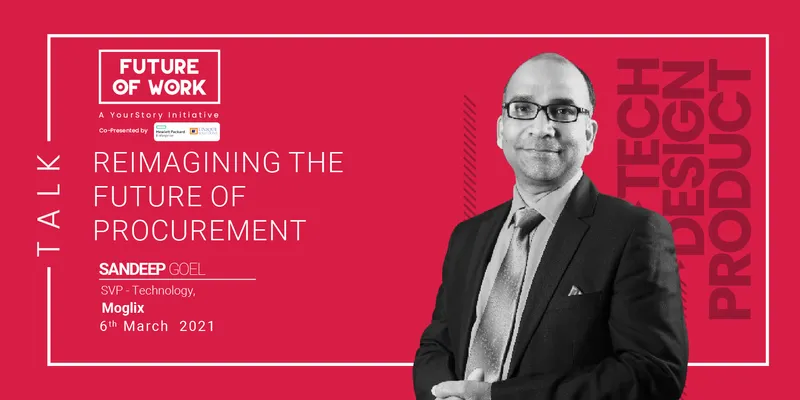Future of Work: Sandeep Goel, SVP of Moglix, on how technology will pave the way for a futuristic manufacturing sector
While delivering a talk on Day 2 of the fourth edition of the Future of Work summit, Sandeep Goel, SVP of Moglix, spoke about the evolution of the B2B ecommerce and manufacturing sector over the years, and how 2020 changed everything.
The year 2020 can safely be called one of the most unique years for India’s manufacturing sector. Moreover, the COVID-19 pandemic compelled the sector to reboot and restart like never before.
While delivering a talk on Day 2 of the fourth edition of the Future of Work summit, Sandeep Goel, SVP of , highlighted the evolution of the B2B ecommerce and manufacturing sector over the years, saying that 2020 had changed everything. Moglix is a B2B ecommerce platform that supplies industrial goods and equipment.
Make in India campaign boosted
One of the most obvious outcomes of the pandemic was the acceleration of ‘Made in India’ products, according to Sandeep.
He further highlighted that even though supply chains were disrupted because of the pandemic, and there was uncertainty around the source of raw materials, the positive result of all the disruption (at the global level) was the boost given to local supply chains and economies.
“Demand and supply started matching within our country,” he said. Sandeep further added that companies operating in the offline space took the initiative to go online in the wake of the pandemic, “This change was seen across organisations right from the bottom of the pyramid to the top companies.”

Challenges that persist
While the pandemic did bring about several changes that boosted India’s manufacturing sector, Sandeep in his keynote session on ‘Reimagining the Future of Procurement’ outlined key challenges that continue to persist - the master data used is not clean and streamlined; transaction data integration continues to remain a challenge, and there is a lack of intuitiveness when it comes to applications.
Sandeep said that an organisation has to deal with several kinds of data including internal data, client data, supplier data, logistics, and service provider data. However, he said, “If all four of these are not in sync, it becomes a nightmare (for the company).”
He further notes that duplicate or incomplete data creates issues in order processing, which has a detrimental effect on the company’s operations.
He gave an example of the predicament his organisation had to undergo once. “We received an order for something called ‘jalebi lights’. My team was at an utter loss, and we had to go back to the client, who then clarified that ‘jalebi lights’ refer to spiral-shaped LED lights.”
He further explained that when applications are not intuitive, a process that should not take longer than five or 10 minutes, takes a few days to complete.
Leveraging technology to overcome these challenges
According to Sandeep, the challenges in creating an efficient supply chain can be overcome using technologies like artificial intelligence (AI) and machine learning (ML). “AI and ML are very powerful tools in solving master data problems,” he said, adding, “The algorithms can help detect duplicity and ML can help you look up historical data.” For example, if a customer orders ‘jalebi lights’ for the first time, it can be referenced as spiralled LED lights using ML, so that the next time a similar order comes, there is no discrepancy or delay.
“AI and ML will be master data cleansing technology in the future.”
Sandeep also added that the role of product managers is extremely critical. “They must design the application in a manner that requires the least amount of training and is reliable.”
Future of manufacturing
Sandeep said that while the Internet of Things (IoT) has become popular and has gained popularity in recent years, what he predicts in the future is ‘Commerce of Things.’ He explained, “In Commerce of Things, a washing machine will be able to send a request to an e-commerce website days before the washing powder is about to get over.”
He also added that drones, flying cars, etc. will further revolutionise the logistics segment to a great extent.
Finally, what will the future of manufacturing look like? “A turbine running in a plant sends a message to the e-commerce company for a ball bearing. When the order is placed, a drone will fly to the warehouse, pick up that bearing and deliver it to the plant.” Sandeep concluded.
A big shout out to our Future of Work 2021 Co-presenting Sponsors Hewlett Packard Enterprise and Unique Solutions; Digital Excellence Partner, Google Cloud; Associate Sponsor HP and Intel; and Sponsors: Atlassian, Freight Tiger, Archon I Cohesity, TeamViewer, and Pocket Aces

Edited by Diya Koshy George









